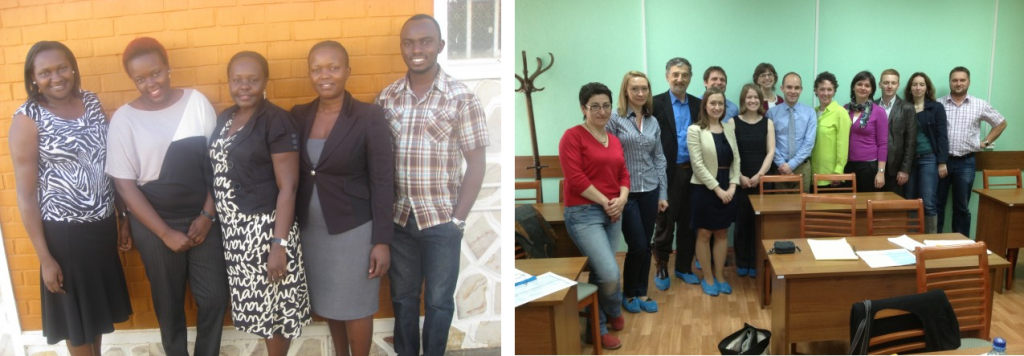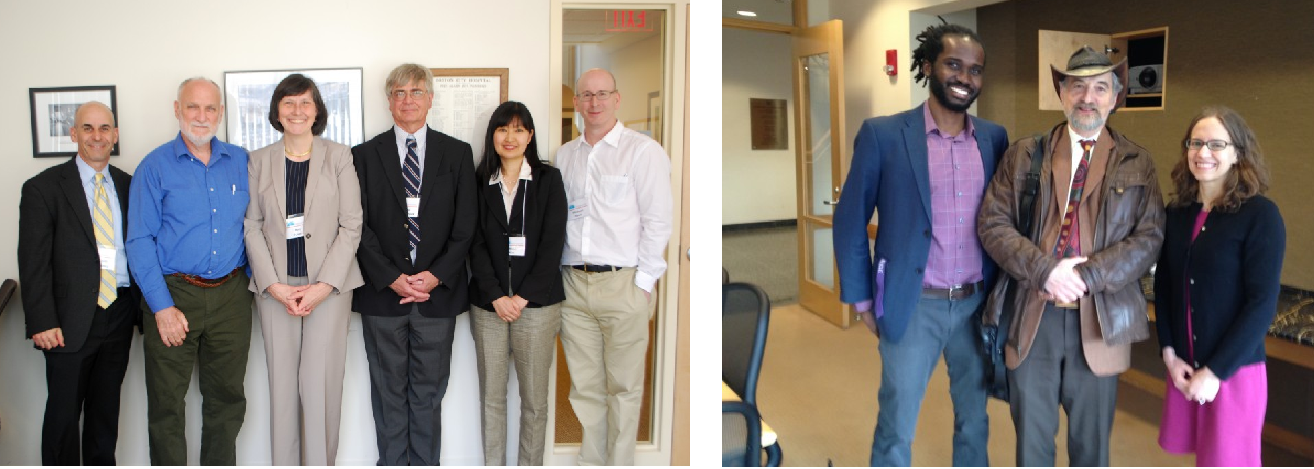URBAN ARCH: Taking a Look Back as We Head into 2017 & Beyond
URBAN ARCH: Taking a Look Back as We Head into 2017 & Beyond
As we move forward with the renewal studies, URBAN ARCH takes a look back over the past 5 years and acknowledges the accomplishments and progress of the Uganda, Russia, and Boston cohorts.
Uganda ARCH recruited 447 individuals into the ADEPT study, including 60% current drinkers, in order to determine the effect of heavy alcohol consumption on HIV disease progression prior to the start of ART and to explore biological and behavioral pathways by which heavy alcohol consumption may accelerate HIV disease progression prior to the initiation of ART. Dr. Hahn and several trainees from the University of California San Francisco and the Mbarara, Uganda, University of Science and Technology leveraged Uganda ARCH into newly funded alcohol/HIV research studies and fellowships. Dr. Hahn received a prestigious K24 Mid-career Investigator Award in Patient-Oriented Research to build her research and mentoring program in HIV/alcohol comorbidity, a UCSF Center for AIDS Research Established Investigator pilot award, and an award from the US Department of Defense. Select research findings are highlighted below:
- No evidence of accelerated CD4 decline by drinking status among persons with HIV prior to ART.
- Hahn JA, Cheng D, Emenyonu N, Lloyd-Travaglini CA, Ngabirano C, Kekiibina A, Adong J, Fatch R, Bridden C, Muyindike W, Samet JH. Unhealthy alcohol use and HIV disease progression in two ART naive Ugandan cohorts. Alcohol Clin Exp Res. 2015; 39(S1):268A. 38th Annual Research Society on Alcohol Scientific Meeting; San Antonio, TX.
- Within examination of under-reporting of alcohol use in an HIV clinic, there was a high proportion of under-reporting (29% who denied any alcohol use in the prior year had PEth>=8 ng/ml).
- Muyindike WR, Lloyd-Travaglini CA, Emenyonu NI, Adong J, Ngabirano C, Fatch R, Winter M, Cheng DM, Samet JH, Hahn JA. Under-reporting of alcohol consumption among persons with HIV not yet on ART in Mbarara, Uganda. Alcohol Clin Exp Res. 2015; 39(S1):200A. 38th Annual Research Society on Alcohol Scientific Meeting; San Antonio, TX.
- Carrico AW, Hunt PW, Emenyonu NI, Muyindike W, Ngabirano C, Cheng DM, Winter MR, Samet JH, Hahn JA. Unhealthy alcohol use is associated with monocyte activation prior to starting antiretroviral therapy. Alcohol Clin Exp Res. 2015;39(12):2422-6. PMCID: PMC4712082.
- Thakarar K, Asiimwe SB, Cheng DM, Forman L, Ngabirano C, Muyindike WR, Emenyonu NI, Samet JH, Hahn JA. Alcohol consumption in Ugandan HIV-infected household-brewers versus non-brewers. AIDS Behav. 2016;20(10):2408-17. PMCID: PMC5025349
l-r: Uganda ARCH team members; Russia ARCH team members
Russia ARCH established a cohort of 250 HIV-infected Russian drinkers and assessed the longitudinal association between alcohol consumption and biomarkers of microbial translocation and inflammation/altered coagulation. It then expanded to 351 participants to allow additional recruitment for the ZINC trial, which is testing the efficacy of zinc supplementation compared with placebo to: 1) improve biomarkers of mortality (VACS index); 2) slow HIV disease progression (CD4 cell count); 3) improve markers of CHD risk (Reynolds risk score); and 4) decrease microbial translocation and inflammation (serum biomarkers). Russia ARCH/ZINC RCT was successful in receiving three administrative supplements: 1) examining the association between alcohol consumption and HIV on adaptive immune dysfunction utilizing flow cytometry, 2) a diversity supplement awarded to Kaku So-Armah to examine the role of liver disease, alcohol, and immune dysfunction in the ZINC study, and 3) a gender diversity supplement for Judith Tsui and Jennifer Wagman to conduct sex/gender comparative analyses using existing data from the Russia ARCH/ZINC RCT cohort. Select research findings are highlighted below:
- Among HIV-infected Russian PWID, women had significantly higher odds of unprotected sex in the past 90 days.
- Gnatienko N, Tsui JI, Wagman JA, Cheng DM, Raj A, Blokhina E, Toussova O, Forman L, Lioznov D, Samet JH. Gender differences among people who inject drugs with regards to HIV transmission risk in St. Petersburg, Russia. 2016; College on Problems of Drug Dependence 78th Annual Scientific Meeting; Palm Springs, California.
- So-Armah KA, Edelman J, Cheng DM, Doyle MF, Patts GJ, Gnatienko N, Krupitsky EM, Samet JH, Freiberg MS. Effects of heavy drinking on T-cell phenotypes consistent with immunosenescence in untreated HIV infection. Alcohol Clin Exp Res. 2016;40(8):1737-43. PMCID: PMC5070699.
- Tsui JI, Cheng DM, Coleman SM, Blokhina E, Gnatienko N, Bryant K, Krupitsky E, Zvartau E, Samet JH. Pain and risk behaviors among HIV-infected persons in St. Petersburg, Russia. AIDS Behav. 2016. [Epub ahead of print].
- Tsui JI, Ko S, Krupitsky E, Lioznov D, Chaisson CE, Gnatienko N, Samet JH. Insights on the Russian HCV care cascade: minimal HCV treatment for HIV/HCV co-infected PWID in St. Petersburg. Hepatol Med Policy. 2016;1:13.
l-r: Margo Godersky. Rich Saitz, and Alicia Ventura; Matt Freiberg and Debbie Cheng
Boston ARCH established a longitudinal cohort of 250 HIV-infected men and women with a spectrum of alcohol use, and all with substance dependence or injection drug use, to determine the effect of alcohol consumption on changes in bone health prospectively. Its primary outcome was annual mean percent change in femoral neck bone mineral density. One highlight of Boston ARCH was Theresa Kim receiving an NIAAA administrative supplement to examine the effects of alcohol and opioid consumption on bone turnover markers. Select research findings are highlighted below:
- No significant associations were detected between lifetime alcohol use or current drinking and bone mineral density (spine, femoral neck, hip). In preliminary analyses, associations between 12-month change in drinking and changes in bone mineral density were not significant. However, current alcohol consumption was associated with double or more the rate of osteopenia or osteoporosis.
- Saitz R, Heeren TC, Winter MR, Holick MF, Sullivan M, Walley AY, Ventura AS, Meli SM, Turner AK, Samet JH. No association detected between alcohol consumption and bone mineral density in HIV-infected adults with substance dependence. Alcohol Clin Exp Res. 2014; 38(S1):271A-271A. 37th Annual Research Society on Alcohol Scientific Meeting; Bellevue, WA.
- Saitz R, Ventura AS, Winter MR, Heeren TC, Holick MF, Sullivan M, Walley AY, Patts GJ, Meli SM, Turner AK, Samet JH. Lifetime alcohol use and bone mineral density in HIV-infected adults with substance dependence. Alcohol Clin Exp Res. 2015; 39(S1):268A-268A. 38th Annual Research Society on Alcohol Scientific Meeting; San Antonio, TX.
- HIV-infected adults who are partnered may engage in higher risk sexual and substance use behaviors than those who are non-partnered.
- Bazzi A, Sullivan M, Drainoni MD, Heeren T, Ventura AS, Walley AY, Saitz R. Sexual risk and substance use behaviors among partnered and non-partnered HIV-infected adults with substance dependence. 2016; College on Problems of Drug Dependence 78th Annual Scientific Meeting; Palm Springs, California.
- In patients with HIV infection and substance dependence, odds of lifetime non-fatal overdose was significantly higher with each medication overall and each sedating medication, and odds of accident/fall was significantly higher with each additional medication overall and each additional sedating medication.
- Kim T, Walley A, Ventura AS, Lerner G, Patts G, Heeren T, Saitz R. Polypharmacy and non-fatal overdose in patients with HIV infection and substance dependence. 2016; College on Problems of Drug Dependence 78th Annual Scientific Meeting; Palm Springs, California.
- Kim T, Walley A, Ventura AS, Lerner G, Patts G, Heeren T, Saitz R. Polypharmacy and risk of falls and fractures for patients with HIV infection and substance dependence. 2016; Society of General Internal Medicine Annual Meeting; Hollywood, FL.
- The number of substance dependence criteria (drug dependence in particular), not specific substance use, was associated with a lack of virologic control.
- Nolan S, Walley AY, Heeren TC, Patts GJ, Ventura AS, Sullivan M, Samet JH, Saitz R. Substance dependence criteria, not substance use, associated with HIV virologic control. Drug Alcohol Depend. 2015; 156e163. College on Problems of Drug Dependence 77th Annual Scientific Meeting; Phoenix, AZ.
l-r: Scientific Advisory Panel members & Kendall Bryant; Kaku So-Armah, Jeffrey Samet, and Jennifer Edelman
In addition to managing the URBAN ARCH data and sample repository, the Administrative Coordinating (Admin) and Biostatistics and Data Management (BDM) Cores have also facilitated collaboration between the cohorts on several cross-cohort analyses, including:
- Alcohol and food insecurity [Uganda, Russia, & Boston]
- Women’s alcohol use and social support [Uganda, Russia, & Boston]
- Undetectable viral loads while reportedly not on ART [Uganda & Russia]
- Alcohol types and HIV disease progression [Uganda & Russia]
- PEth as a biomarker [Uganda & Boston]
The consortium has engaged approximately 20 students, research fellows, and faculty in its research projects on various analyses ranging from the examination of polypharmacy, falls and fractures in individuals with both HIV infection and substance dependence (Theresa Kim, Boston ARCH) to understanding unhealthy alcohol use and its association with monocyte activation prior to starting ART (Adam Carrico, Uganda ARCH). URBAN ARCH investigators, along with NIAAA Scientific Collaborator Dr. Kendall Bryant, also published a review on the current knowledge, implications and future directions for alcohol and HIV. For those interested in using URBAN ARCH repository data and samples for HIV- and alcohol-related analyses, please click here to learn more.
As we prepare for the next 5 years of the consortium, URBAN ARCH looks forward to continuing and expanding upon its current research, and working alongside both domestic and international investigators, trainees, and collaborators.


